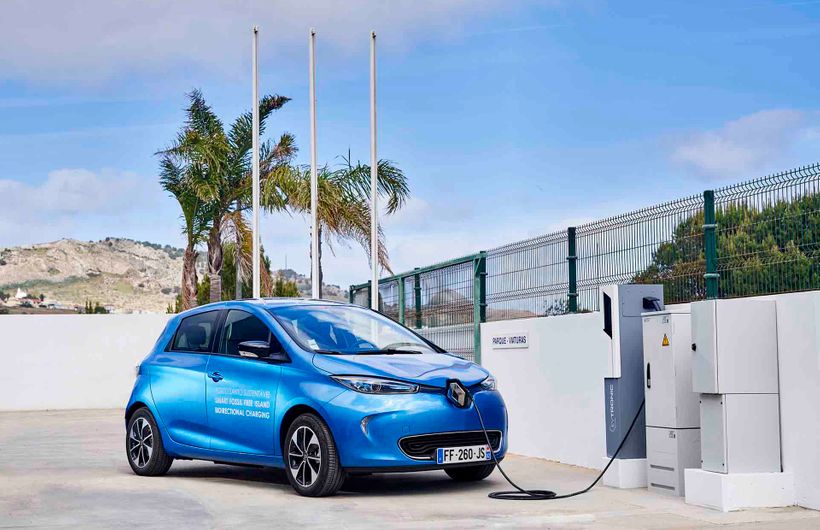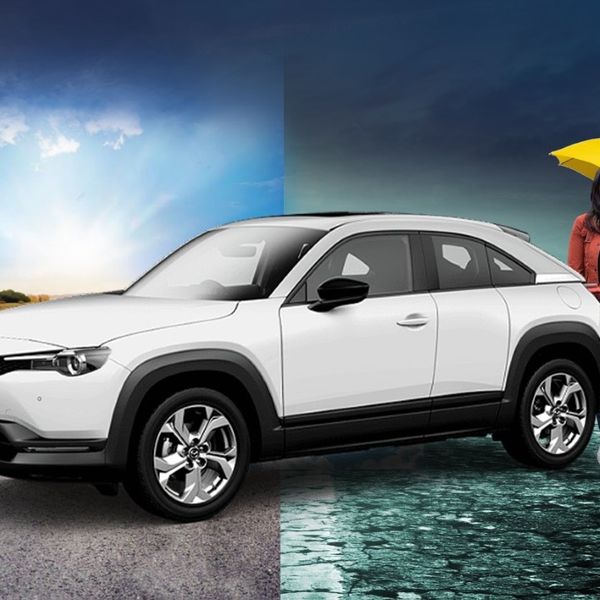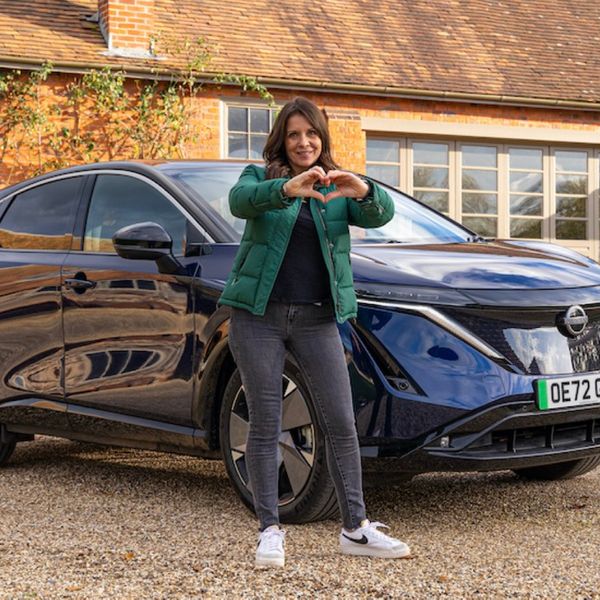The government has announced that it is to bring forward its ban on petrol and diesel cars to 2030, meaning that no new cars powered solely by internal combustion engines will be available to buy new after that date. What does it mean for you? Hopefully we’ve answered all the questions you might have below. But if there's anything we’ve missed, let us know here or on our social channels at @ElectrifyingCom.
What has the Government said about the ban on petrol and diesel cars?
The sales of new petrol and diesel cars and vans will end in 2030 the Prime Minister Boris Johnson has said. It's part of what he's calling a "green industrial revolution" and he's pledged to invest more than £2.8bn in "electric vehicles, lacing the land with charging points and creating long-lasting batteries in UK gigafactories". However, the sale of hybrid cars and vans that can drive a significant distance with no carbon coming out of the tailpipe will continue until 2035. Although at the moment there's no guidance on what "a significant distance" actually consists of.
The news isn't exactly a surprise as Ginny recently presented a programme looking into electric cars for ITV's flagship current affairs show 'Tonight' and asked the Secretary of State for Transport (and Tesla owner) Grant Shapps if he thought petrol and diesel cars would get the green light today. He told her: “You’ll look back and think ‘My God, we actually allowed vehicles to pump out noxious fumes, and kids to walk past to go to school - and thought nothing of it.’ ”
Why is the government bringing in the ban?
The government has a vision to make the country greener, partly because it sees it a good thing. It's pledged to eradicate the UK contribution to climate change by 2050. But it isn't all environmental altruism, there are also international laws around the growth of greenhouse gases and a reliance on imported oil and gas is dangerous for our standing in the world. Electricity is a fuel which can be made domestically, sustainably.
![Ginny Buckley and Grant Schapps]() Ginny got the low down from the man in charge of transport policy - Grant Shapps
Ginny got the low down from the man in charge of transport policy - Grant Shapps Does that mean I'll have to scrap my petrol or diesel car by 2030?
No, the ban is only on the sale of new petrol and diesel cars. The average life of a car before it's scrapped in 13.9 years, so we're going see petrol and diesel cars bought just before the 2030 deadline will be on the road until well into the mid-2040s. But expect the numbers to dwindle as car makers won’t be investing in the technology over the next decade and it’s expected that consumers won’t want them anyway. Petrol and diesel fuel will still be available at filling stations, but again expect pumps to gradually be replaced with chargers.
But I love a V8! This means the death of fun cars, doesn’t it?
We love a V8 too – but we also love electric cars and there's plenty of fun to be had in them. The instant acceleration and power you get in an electric car can be addictive. Five minutes behind the wheel of a Porsche Taycan will convince you of that! In fact, the development of electric car ‘platforms’ means there could be even more interesting models as they are easier to engineer with different bodies. Just look at what VW is proposing to build using the bits of its ID.3 – everything from beach buggies to retro campers. And see what makers like Pininfarina, Ferrari, Bentley, Lamborghini, Lotus and Porsche are launching too. The future for performance cars looks bright.
What about my classic car, will I still be able to drive it?
The jury is out on this one. Some classic car experts predict that the bottom may fall out of the mainstream classic market, with examples like the DB5 or Ferrari Daytona becoming gallery pieces. While others predict a boom as petrol heads who can no longer get their fix with a new car switch to classics. But we're bound to see increasing taxes on classic cars and potential bans from urban areas.
What about trucks, vans and buses?
They won’t escape the ban entirely. The PM said “trucks, trains, ships and planes will run on hydrogen or synthetic fuel.” Hydrogen is more suitable than batteries for heavy vehicles as it can be quickly replenished and means there is no need for the big batteries which would be needed to propel a weighty load. But it is pretty inefficient to produce, so isn’t ideal for other forms of transport. Synthetic fuel is also created by using electricity and could become the norm for vehicles which still need to burn things to make them go, such as planes.
What's the £2.8 billion being spent on?
A few things it seems. First, they will ensure the grants to help buy electric cars and vans continue. Currently the government will help out with £3,500 off the price of a car and up to £8,000 towards a van. Secondly, there will be subsidies to help install charging points. As one MP told us: “We can’t tell people they have to have electric cars without giving them a viable alternative”. Finally, there will be incentives of up to £1bn to help create electric vehicle and battery manufacturing in the UK.
![]() Hydrogen trucks could be loads better than diesel
Hydrogen trucks could be loads better than diesel The PM talked about Gigafactories, what are they and why do we need them?
A Gigafactory is just a very large battery production operation. It makes sense to build them big as they are extremely complex, and you save money and increase efficiency if they’re assembled on a large scale. We need them because battery production is a growth industry, but there currently isn’t enough supply to keep up with the demand for electric cars.
By supporting the development of manufacturing in this sector, the government will help UK industry and support big car makers like Nissan, Jaguar, Land Rover and Toyota. The battery makes up around 25% of the cost of a new car and it will mean we don’t have to import these expensive components from abroad.
If we are all plugging in our cars, will the electricity grid be able to cope?
According to experts including the National Grid and OVO Energy, yes it will. In fact, electric cars can help balance the demands on the electricity infrastructure because they tend to be charged mainly at night when there is typically energy from power generation ‘going spare’ as we are not using it in our homes or industry. V2G systems will also mean the grid can borrow back power from electric car batteries when they are plugged in and there is a sudden surge in demand. Like when the adverts come on in Coronation Street and everyone turns on the kettle.
But there will also be extra generation capacity added, using renewables. The government is calling it a "green industrial revolution" and it will include new offshore wind power and (controversially) nuclear too.
![]() V2G will help balance the grid
V2G will help balance the grid What will be the law on hybrids after 2030?
The government has retreated here a bit. The PM’s statement says: “We will allow the sale of hybrid cars and vans that can drive a significant distance with no carbon coming out of the tailpipe until 2035.” And as we've said details around this are going to be key. According to our sources it is unlikely to include mild hybrids (which don't have a plug), but plug-in hybrids and cars with a range extender will be allowed if they have a reasonable electric-only driving range.
But electric cars aren’t suitable for my journeys! What am I meant to do?
Don’t fret; it will be OK. A lot will change in 10 years for a start. A decade ago we’d never heard of things like a Kindle, the iPad had just been launched, Tesla hadn't started making cars properly and the Nissan Leaf was still a couple of years away. So car tech will move rapidly to make electric cars cheaper and easier to charge. If that doesn’t work, you can always buy a used diesel or a plug-in hybrid and drive it for as long as you like. But the chances are you won’t want to as the new electric cars cars heading your way are going to be very tempting.
![Blue Tesla Model S on beach with surfboard on roof]() Tesla's Model S didn't even exist a decade ago
Tesla's Model S didn't even exist a decade ago What about the government? It’s just being hypocritical isn’t it? I don’t see any MPs driving electric cars.
Well, the Secretary of State for Transport is a Tesla Model 3 owner. In fact, Grant Shapps’ experiences have helped shape the policy. He’s also in charge of the ministerial transport department for the whole of government, and says he’s moved a quarter of the fleet to electric with the rest being moved over when the old cars are replaced.
![Black Porsche Taycan front and left side driving]() Porsche - proving electric is fun
Porsche - proving electric is fun I’ve heard electric cars are actually worse for the environment because of the battery component mining. Is this true?
There are a lot of studies which suggest this, but we’d ask that you dig deep to find out who is funding and pushing these reports to make sure it’s not biased. That said we are clearly biased too as we love electric cars – so we’ll take the lead from Greenpeace and the government to decide.
Grant Shapps told us: “I went to my officials in the Department for Transport, and asked for chapter and verse. And there is absolutely, no doubt, and no competition. Driving in a battery electric car is, from an environmental point of view, far better, than driving over an average lifetime, a petrol or diesel car.”
Also bear in mind that battery production and energy is becoming more sustainable all the time, whereas oil production is difficult to make ‘green’ and also has harmful effects on the environment when extracting.
Electric cars are too expensive. What about low-income drivers? How will they be able to afford it?
Electric cars are certainly more expensive to buy then a petrol car currently, but the total cost of ownership calculations will often mean they are cheaper over a few years because of the savings in running costs. With incentives such as salary sacrifice, drivers will often see their monthly leasing costs dip below the level of a petrol car.
For drivers who need to go for a used car, there will still be plenty of petrol and diesels around as the new cars of today will be affordable bangers in 2030. There will also be 19 year-old Nissan Leafs which will almost be old enough to consider classics. Even with a limited range and depleted batteries they will be able to provide very cheap motoring for drivers who just need to do shorter daily distances.
![Blue used Nissan Leaf for sale]() The first Leaf will be in banger territory by 2030
The first Leaf will be in banger territory by 2030 Where are all these cars going to charge? I live in a flat!
Clearly there is going to be a rapid growth in the number of chargers to make it easy. If you have off street parking it’s easy – you’ll just wake up to a full battery every morning. If there’s a car park at work, you’ll be able to plug in there by 2030 too.
If that’s not going to be possible, then it’s probably best to think about have a car with a larger capacity battery which you can drive all week without needing a charge, and then topping up at a rapid point at the weekend. There will be more of these at places like supermarkets, gyms and restaurants so you can do something useful while your car is plugged in for 30 minutes to an hour.
Looking further ahead, there are already plans to introduce wireless kerbside charging which would mean you don’t even have to plug in to top up from a charger built into the kerb. It uses the same method as your phone or electric toothbrush, so there doesn’t have to be a physical connection between the car and the point at all. Combine that with autonomous cars and it gives us the very real possibility that your car will move itself off a charging spot when the battery is full, allowing your neighbour’s to move itself in to begin topping up its battery. It might seem fanciful, but prototype systems already exist.
What do the car makers say about it all?
Understandably, the ones who are geared up for the revolution are all very keen. But many other companies will struggle, and will either disappear completely or be forced into alliances with other manufacturers. Suzuki, for example, is already rebadging Toyota products to meet its emissions obligations. But expect lots of new makers to emerge too – Tesla didn’t even launch its first ‘proper’ car until 2012 so a lot can change in a few years.
![]() Wireless charging and autonomous cars could be the answer
Wireless charging and autonomous cars could be the answer 

















